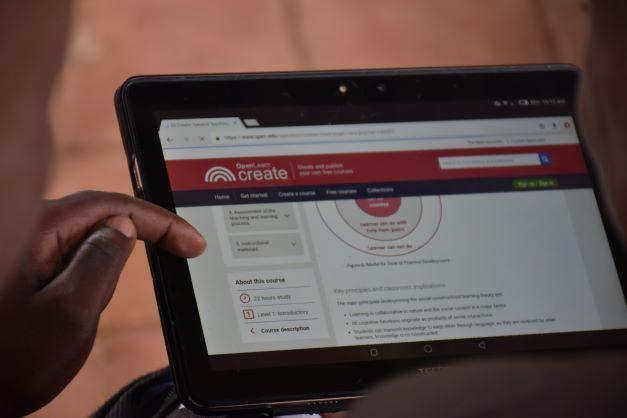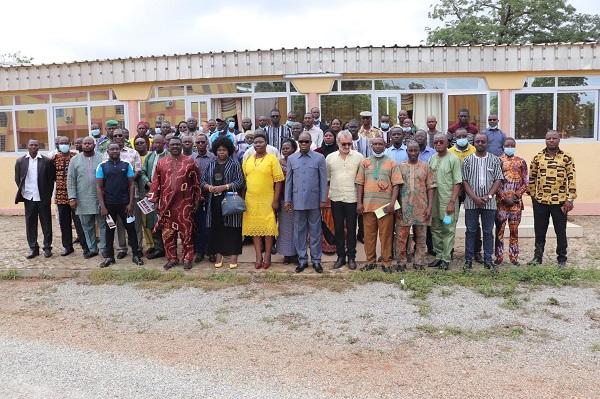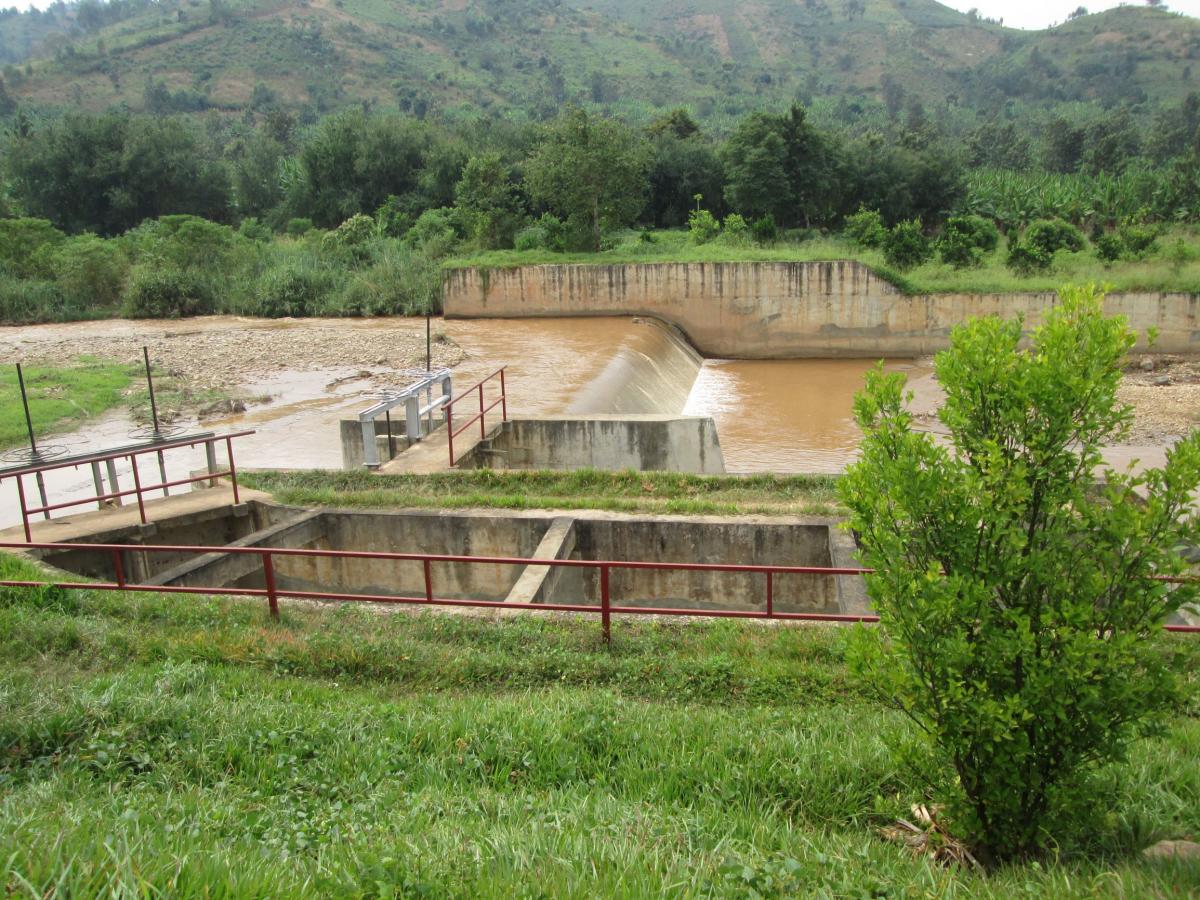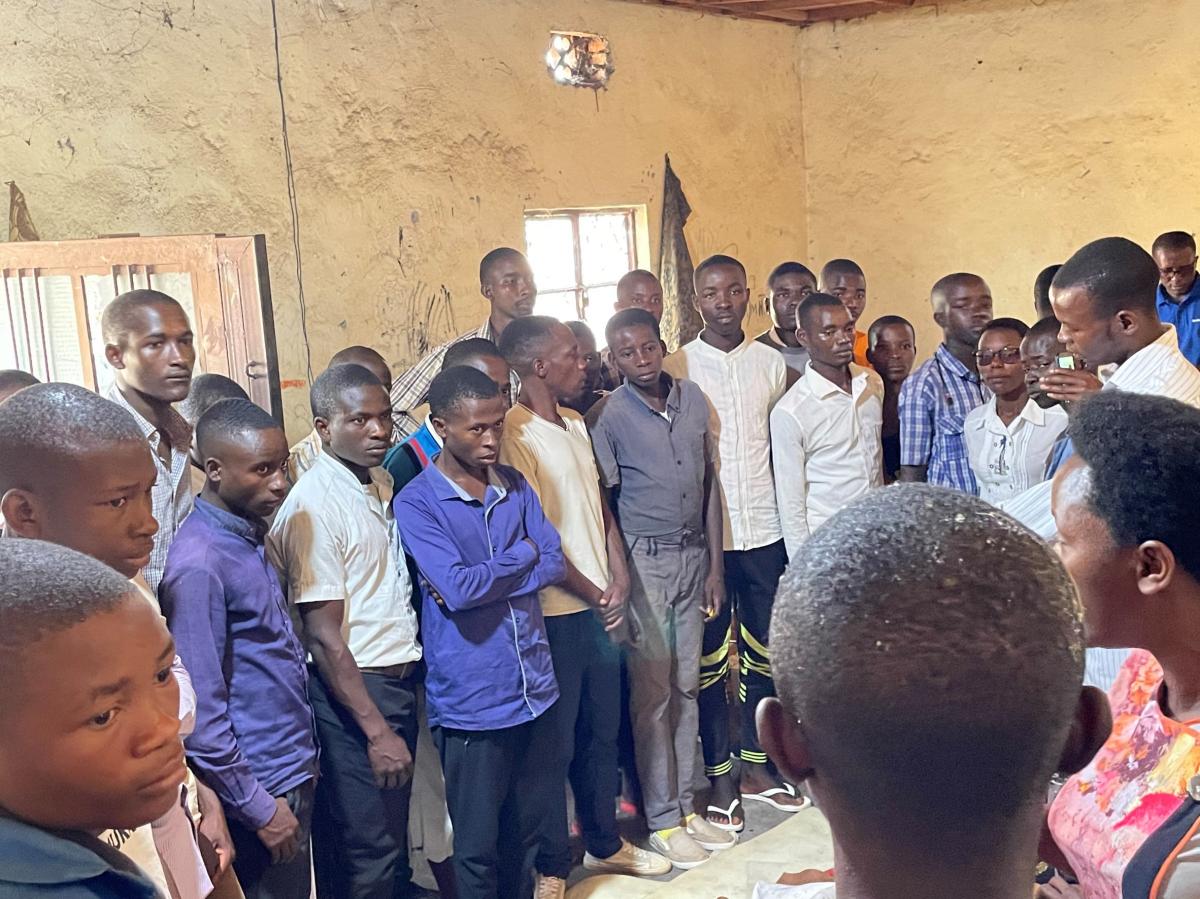Search
Viewing 1905 to 1920 of 3123 news
-

Au Bénin, les start-ups et acteurs clés de l’écosystème entrepreneurial numérique améliorent leurs programmes d’idéation
Reece-hermine ADANWENON | 13/08/2021
Du 23 au 26 juin 2021 à grand Popo, 39 SAEI, startups et acteurs clés de l’écosystème entrepreneurial numérique ont travaillé ensemble dans le but d’améliorer les programmes d’idéation qu’elles offrent. L’atelier s’est déroulé autour de deux thématiques clés à savoir: une formation sur les conseils juridiques dans la négociation d’accords de partenariats puis la co-conception des programmes d’accompagnement pré-idéation/idéation. 3 jours durant, les participants à cette rencontre ont : amélioré les programmes de pré-idéation/idéation qu’elles offrent ;proposé des contrats adaptés entre eux et les start-ups qu’ils accompagnent ; négocié des accords/convention avec d’autres partenaires;Financé par l’Union Européenne et mis en œuvre par Enabel au Bénin, le projet Digiboost vise à accroître la performance des entrepreneurs dans le secteur de l’économie numérique. Pour atteindre cet objectif, plusieurs actions sont menées dont le renforcement des capacités et l’amélioration des performances des Structures d’Accompagnement à l’Entrepreneuriat Innovant (SAEI) et la qualité des services offerts aux startups numérique au Bénin. Accords et/ou convention de partenariat : formation sur les notions juridiques Le programme de cet atelier avec les SAEI du Bénin a débuté par la formation sur les conseils juridiques dans la négociation d’accords de partenariats. Les SAEI proposent en effet des services, de l’accompagnement et elles sont très souvent amenées à négocier des accords et des conventions de partenariats avec d’autres structures. L’instabilité des échanges fait qu’il est cependant plus judicieux de garder une trace écrite de l’accord passé entre les deux parties. L’avocat à la cour Maitre Hugo KOUKPOLOU a fait deux communications très instructives dont la première portait sur les précautions à prendre et les conseils juridiques en matière de négociations d’accords/conventions. Les SAEI et les entrepreneurs présents se sont très rapidement sentis concernés par les différentes notions abordées durant cette première communication. Quant à la seconde communication, l’avocat a fait une présentation autour du modèle de contrat type entre les SAEI et les Start up, afin d’en ressortir les clauses pour un contrat avec des partenaires. L’accent a été mis sur les termes clés à retrouver dans un contrat pour veiller à la protection des intérêts de chacune des parties.Co-conception des programmes d’accompagnement pré-idéation Pour une structure d’accompagnement, le programme de pré-idéation et d’idéation est incontournable pour faciliter l’insertion dans le milieu de l’entrepreneuriat. De ce fait, il est important que ces notions soient claires aussi bien pour les structures d’accompagnements que pour les entrepreneurs suivis. À travers donc des travaux de groupe coordonnés par le cabinet PWC (PricewaterhouseCoopers), les représentants des SAEI présents à l’atelier ont pu : redéfinir et assimiler le principe de pré-idéation et idéation ; dresser des objectifs et les cibles de ces programmes ; élaborer un modèle type du contenu d’un programme de pré-idéation et idéation.Après les plénières, un programme de pré-idéation/idéation consolidé a été établi prenant en compte l’ensemble des apports qu’ont fait les SAEI et les entrepreneurs présents à l’atelier. L’atelier s’est alors terminé par une session de travail entre les SAEI volontaires et le cabinet PWC puis des partages d’expériences, des moments de Networking entre les SAEI elles-mêmes.
-
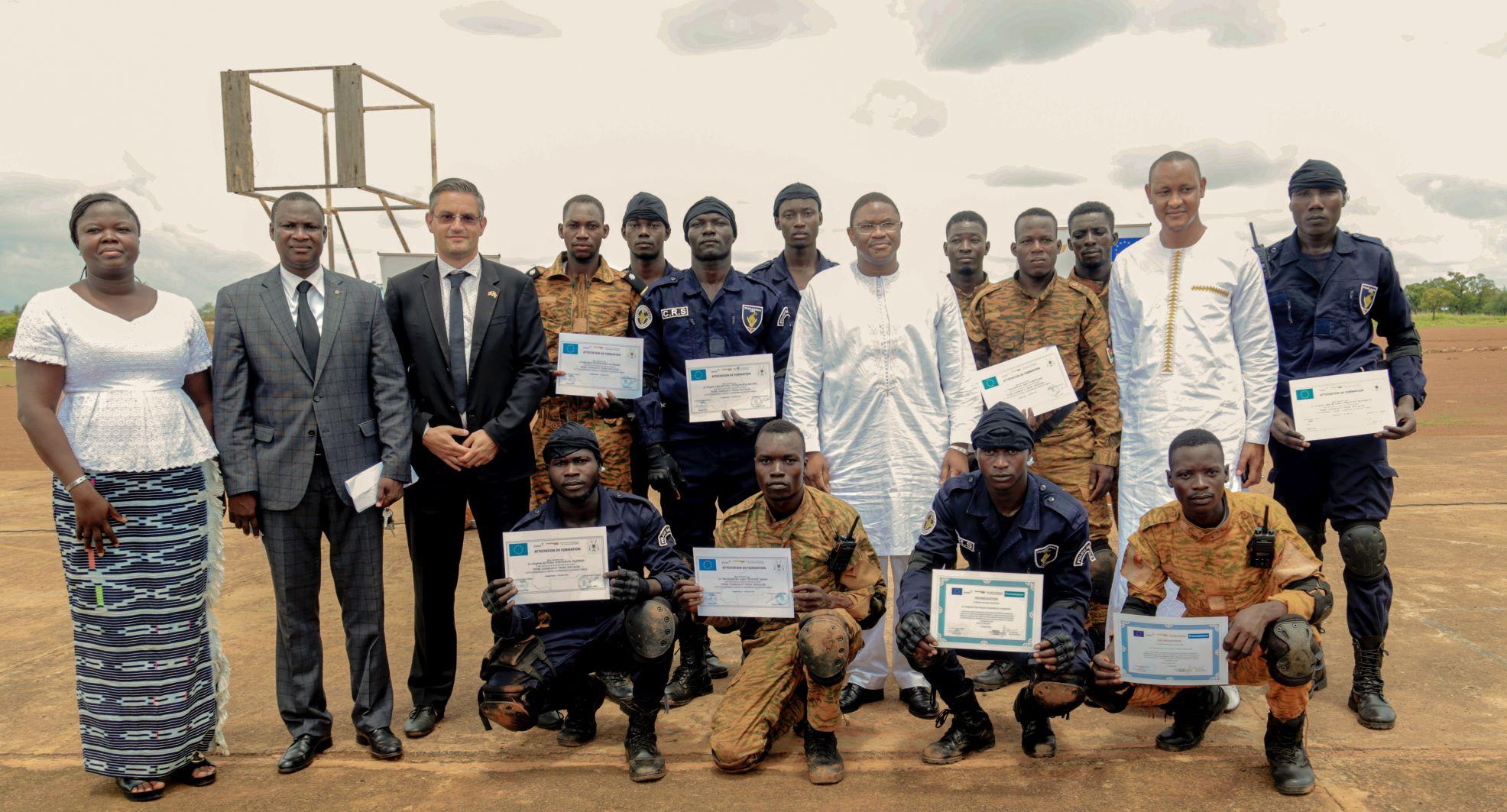
Enabel renforce les capacités de près de 300 éléments des Forces de sécurité intérieure de la région de l’Est
Kimsegninga SAVADOGO | 12/08/2021
Environ 300 éléments des unités mobiles de la Compagnie Républicaine de Sécurité (CRS) et du 34e escadron de Gendarmerie mobile de Fada N’gourma en fin de formation ont reçu des attestations au cours d’une cérémonie organisée le vendredi 06 août 2021 au camp SND de Loumbila dans la région du Plateau Central. Cette cérémonie marque la fin d’un des volets les plus importants de la phase 1 du projet d’appui à la stabilisation de l’Est du Burkina Faso (STABEST). Financé par l’Union européenne sous l’Instrument Contribuant à la Stabilité et la Paix (IcSP) et exécuté par Enabel, le projet STABEST vise à renforcer les capacités des unités de la Police Nationale et de la Gendarmerie Nationale, et renforcer la confiance entre ces unités et la population dans la région de l’Est. Pendant 5 mois, les unités ont bénéficié des formations en tronc commun avant de suivre, chacune pour ce qui concerne sa spécificité, des formations en troncs spécialisés pour une durée de 3 mois. Le triple objectif de ce programme de formation était « de renforcer les capacités d’intervention des unités en l’adaptant à l’évolution de la menace dans la région de l’Est, tout en améliorant la cohésion et la collaboration entre Gendarmerie et Police, et en privilégiant la résolution concertée des conflits pour un rétablissement de la confiance avec les populations », dixit Nicolas OEBEL, Chef de Projet STABEST. « Notre souhait le plus ardent est que ce projet puisse s’étendre sur toutes les autres régions du Burkina Faso » Selon le représentant des stagiaires, le Sergent de Police Valentin OUEDRAOGO, cette formation a permis de renforcer la cohésion entre Forces de Sécurité Intérieur (FSI), et entre FSI et populations. « Le projet nous a permis également d’améliorer nos connaissances en matière de médiation, de secourisme, d’extrémisme violent, de Droit International Humanitaire et j’en passe. En plus, STABEST a renforcé notre matériel logistique en moyens roulants, en équipements de protection individuel et collectif et bien d’autres. » foi de Valentin OUEDRAOGO, porte-parole des stagiaires.A Enabel et à ses partenaires, les impétrants ont dit : « notre souhait le plus ardent est que ce projet puisse s’étendre sur toutes les autres régions du Burkina Faso afin que nos frères d’armes qui y sont bénéficient également des formations que nous avons reçues ». Le ministre de la Sécurité Maxime KONE, patron de cette cérémonie a salué l’initiative de Enabel et de ses partenaires qui ont pu conduire cette première phase du projet STABEST aux bénéfices énormes pour le Burkina Faso. Après avoir suivi les démonstrations des stagiaires sur une embuscade et une prise d’otage, Maxime KONE se dit confiant et souhaite que ces compétences acquises soient d’un apport considérable dans la lutte contre l’insécurité. « Je suis encore plus satisfait que ces éléments qui ont été formés sont venus du terrain. Cela veut dire qu’en réalité, ils connaissent mieux leur environnement. Si nous avons déjà des gens sur le terrain qui sont formés, qui connaissent la réalité, je pense que cela va être quelque chose de très important pour nous », ajoute le chef du département en charge de la sécurité. Débutée le 1er novembre 2019, la première phase du projet STABEST finit le 31 août 2021. La seconde phase qui est déjà en cours depuis février 2021 est une reconduction des activités de la première avec de nouvelles unités mobiles des régions de l’Est et du Centre-Est et prendra fin en juillet 2022. Geoffroy ZONGOCommunication officer
-
Enabel’s First Online Teachers’ Course Gains Popularity in Uganda
Peace NERIMA | 11/08/2021
Online courses are a rapid growing trend in today’s education. There is some skepticism as to whether online courses are just as effective and educational as traditional face to face interactions with an instructor. However, with the current COVID-19 pandemic, distance learning has become inevitable. In October 2020, the Teacher Training Education Project funded by Ministry of Education & Sports (MoES) and Enabel launched an online General Teaching Methods (GTM) course for lower-secondary pre- and in-service teachers in Uganda. The course was specifically designed for teacher trainers and students in National Teachers’ Colleges (NTCs) that introduces them to teaching methodologies that enhance their pedagogical skills. The GTM course, being the very first of its kind, provides interactive and practical lessons to improve teaching practices for all NTC lectures and students. It also prepares students to teach using the Active Teaching and Learning (ATL) methodology which puts the student at the center of learning. Some of the modules this course offers are: learning and cognition; ATL; classroom management and organization; teaching and learning materials; and assessment of the teaching and learning process. According to Hannah Nayoga, the Sector Expert - Pedagogy for the Teacher Training Education (TTE) project at Enabel in Uganda, the GTM online course is not only improving pedagogy in the Teachers’ colleges but also preparing students to teach and equipping them with both Active Teaching and Learning methodologies and ICT skills due to the different media used in the course. One of the advantages of the General Teaching Methods’ course is that it provides up-to-date digital learning resources on a variety of subjects that can be accessed remotely using a mobile device or computer. NTC teachers and students can take advantage and explore these resources and build their knowledge on the different topics at their own convenience. They can also do the online course over an extended period of time by pausing and resuming the course. Ario Fabius, a student coordinator at NTC Mubende said that with the change of the lower secondary school curriculum, the GTM has helped him teach agriculture, something he never knew is possible using online means.“From this course, I have learnt how to design lesson plans and use ICT tools to teach. I have unlimited access to the content from which I pick ideas to use in my own class.” The online GTM course has gained popularity in the NTCs and has been attended by many teachers, students and partner secondary schools’ teachers which have generally changed learning methods across all areas of study. So far, 2995 NTC students, lecturers and teachers from 21 partner secondary schools have enrolled in this course.More still, 56% of the NTCs’ current population (2632 out of 4699) have successfully completed the course with a statement of participation issued.Kibedi Abdul, the Assistant Commissioner, Secondary Teacher Education (ai) of the Teacher Education Training & Development Department of the Ministry of Education and Sports reaffirmed the Ministry’s position by saying, “We are training quality teachers which has been the main objective of the TTE project from the start. We are working towards achieving impact in the classroom to get teaching outputs that are tangible by focusing on the teacher trainer and teacher trainee as the center of learning.”Having the online GTM course rolled out in partner secondary schools is not only beneficial to NTC students who practice teaching in these schools, but also makes teaching and learning interesting for both the secondary school teachers and their students. To build upon the General Teaching Methods’ course, Enabel together with the NTC lecturers is creating a Technology Enhanced Learning course (TEL) that introduces essential ICT tools needed for Active Teaching and Learning. This is part of the project’s efforts to ensure the adoption of digital education technology to support the continuity of learning during and after the pandemic, but also equip them with relevant skills for the 21st century learners. Click the link to access the course http://bit.ly/GeneralTeachingMethods
-
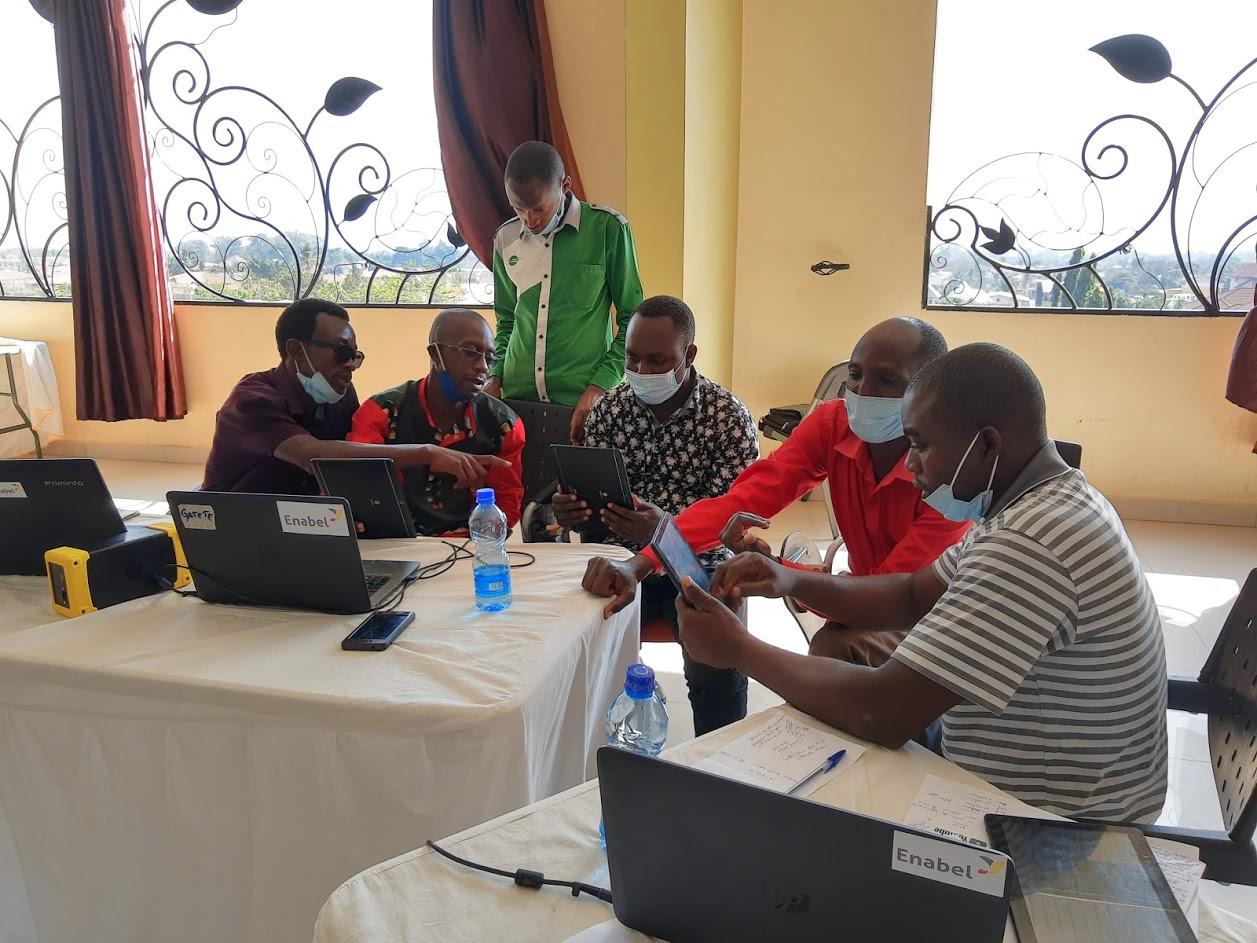
La technologie digitale, une opportunité d’améliorer l’attractivité des Centres d’Enseignement des Métiers au Burundi
Donavine KWIZERA | 06/08/2021
Le projet ACFPT dans son cinquième axe a pour objectif de renforcer l’attractivité de l’Enseignement des Métiers par la digitalisation et la communication pour le développement. Pour répondre à cet objectif, 26 points focaux numériques issus de 13 Centres d’Enseignement des Métiers (CEM) partenaires du projet ont participé à un atelier sur l’exploitation des NTICE (Nouvelles Technologies de l’Information et de la Communication pour l’Enseignement). Le numérique transforme notre mode de vie, il est partout et l’école n’y échappe pas. Il y a encore quelques années, les professeurs avaient comme seuls supports didactiques des feuilles de papier et un tableau, mais le temps a évolué et la digitalisation trouve aussi une place importante dans le système éducatif. Dans le souci d’améliorer la qualité de l’enseignement des métiers et de rendre plus attractif ce secteur, le projet ACFPT a alors équipé 13 CEM de salles multimédias informatisées et connectées qui servent de soutien pédagogique pour l’ensemble des filières enseignées. Après l’équipement de ces centres, il s’est avéré important de former les usagers sur la manipulation et l’utilisation productive des outils et applications. C’est dans cette optique qu’une formation de renforcement des capacités pour l’usage efficace et efficient des applications numériques comme Google Forms, Mentimeter, OpenBoard et autres a été organisée à l’endroit de 26 formateurs et points focaux numériques des CEM, sur une durée de 2 semaines, pour stimuler un apprentissage moderne de qualité. A l’issue de l’atelier, les participants estiment que ces applications numériques vont permettre à l’enseignant et à l’apprenant d’être en interaction, de mieux communiquer et de se ressourcer. « Les applications numériques apprises lors de la formation sont d’une importance capitale car elles sont transversales pour toutes les filières » a dit Jeanine, point focal numérique du centre de formation de Rumonge. « Ça va nous permettre d’être rapide, efficace et gagner du temps, les cours deviennent plus intéressants et moins ennuyants » a poursuivi Jean-Marie, formateur du centre de Kanyosha. La technologie digitale a un énorme potentiel pour améliorer la qualité, l’attractivité et la portée de l’éducation surtout dans le secteur de l’Enseignement des Métiers qui est considéré comme étant non attrayant au Burundi. L’intégration de la technologie digitale pour l’amélioration de la qualité de l’éducation s’inscrit dans l’Objectif de Développement Durable 4 qui est d’ « Assurer une éducation inclusive et équitable de qualité et promouvoir des possibilités d’apprentissage tout au long de la vie pour tous ». Grâce à la digitalisation, l’enseignement est plus accessible, plus personnalisé et adapté au fonctionnement de la génération actuelle. Les apprenants peuvent devenir acteurs de leurs formations et les formateurs se sentir en phase avec cette nouvelle génération.
-
Aménagements hydro-agricoles et pastoraux dans la région du Centre Est, Burkina Faso
Kimsegninga SAVADOGO | 03/08/2021
Enabel facilite l’accès des agro-pasteurs à des infrastructures adaptées à leurs besoinsLe gouverneur de la Région du Centre-Est a lancé, ce jeudi 29 juillet 2021, le projet de Promotion de l’employabilité, la cohésion, l’inclusion socioéconomique des jeunes et des femmes, (PRECIS). Financé par Enabel à travers l’intervention Entrepreneuriat, ce projet d’un coût de 2 millions deux cent mille (2 200 000) euros vise à faciliter l’accès des acteurs du monde de la production agro-pastorale à des infrastructures adaptées à leurs besoins. Il vise également à promouvoir la cohésion sociale et l’accroissement de l’accès des populations à faible revenu, notamment des jeunes et des femmes et des personnes vulnérables (dont des déplacées internes), à des emplois décents dans la Région du Centre-Est. Mis en œuvre par le consortium Welthungerhilfe (WHH) - Association pour la Recherche et la Formation en Agroécologie (ARFA) - Réseau de Communication sur le Pastoralisme (RECOPA) - l’Institut International d’Ingénierie de l’Eau et de l’Environnement (2iE) pour une durée de 27 mois, les investissements prévus consistent en :- douze (12) sites de périmètres irrigués avec un dispositif de micro-aspersion pour la production agricole ;- deux (2) bas-fonds pour la production rizicole ;- six (6) champs fourragers ;- huit (8) magasins pour le stockage et la conservation des produits agricoles ; - huit (8) forages pastoraux ; - 120 km de piste à bétail de transhumance;- quatre (4) aires de repos ; - deux (2) aires de pâturage de 6.500 hectares, sécurisées pour l’ensemble des acteurs. Diallo Abdoulaye, éleveur transhumant dans la région du Centre Est, s'est exprimé sur le projet : « Nous rencontrions des difficultés pour nous déplacer avec nos bétails au-delà des frontières du Burkina Faso, notamment pour ce qui concerne la transhumance entre le Ghana, le Bénin et le Togo. Nous espérons qu’avec les réalisations de ce projet qui contribue à la sécurisation des pistes de transhumance et des aires de pâturage et à la disponibilité en eau pour nos animaux, un certain nombre de ces difficultés seront résolues, car nous aurons des espaces pastoraux avec des ressources disponibles sur place pour nourrir nos animaux ».Adama GNANOU, Chargé de communication pour le portefeuille.
-
Cibitoke : La prise de Nyamagana, moteur du développement de l’agriculture dans les communes de Rugombo et Mugina
Jonas Eric UWIZERA | 03/08/2021
L’agriculture burundaise dépend des saisons et des conditions météorologiques. Mais les communes de Rugombo et Buganda dérogent aujourd’hui à cette règle grâce aux actions du PAIOSA. Dès le départ, ce programme s’est focalisé sur l’amélioration de la compétitivité du secteur agricole. Cette vision d’augmentation de la production s’est concrétisée dans la plaine de l’Imbo, à travers la construction des canaux qui irriguent une zone d’environ 3000 hectares dans les deux communes. Rugombo et Buganda, une terre de basse altitude en deçà des 1000 mètres : Ces deux communes se trouvent dans la province Cibitoke, située à l’ouest du Burundi. C’est une zone de riziculture et de maraîchage par excellence. Cette zone agricole fournit à la ville de Bujumbura des quantités considérables pour répondre à ses besoins en tomates, oignons rouges et blancs, choux, haricots verts, fruits (pastèques, mangues) ainsi qu’une bonne quantité de riz et de maïs. Les travaux d’aménagement du périmètre de l'Imbo-nord ont démarré en 2014 grâce aux financements d’Enabel, à travers son programme PAIOSA. Les infrastructures d’irrigation construites dans ce périmètre permettent aujourd’hui d’irriguer une surface d’environ trois mille hectares dans les deux communes. Pour les agriculteurs de la localité, les canaux d’irrigation construits par le PAIOSA constituent un véritable moteur du développement agricole. Ils affirment que sans ces canaux, ils ne sauraient pratiquer l’agriculture comme ils le font aujourd’hui. Avant la construction de ces canaux d’irrigation, les deux communes dépendaient presque exclusivement de la culture du manioc qui s’adapte à des zones ayant des précipitations faibles. La gestion de ces infrastructures d’irrigation a été confiée dès le départ aux exploitants agricoles réunis au sein des Associations des Usagers de l’Eau (AUE). Ces dernières se sont structurées en fédération et c’est la fédération à qui le Ministère de l’agriculture, élevage et environnement, via son bureau provincial, a confié la gestion du périmètre irrigué. Cette fédération a donc la responsabilité de coordonner toute la gestion de l’eau, de l’entretien du réseau jusqu’au paiement des redevances en passant par la distribution équitable de l’eau à tous les usagers. Mercredi 21 juillet 2021, l’Assistante du ministre de l’agriculture, élevage et environnement, Madame Rose NIZOBAZA, en compagnie de la directrice du bureau provincial de l’Environnement agriculture et élevage, du chef de cabinet du Gouverneur de la province Cibitoke ainsi que le coordonnateur national du programme PAIOSA, a rehaussé de sa présence le lancement des travaux de curage et d’entretien du réseau d’irrigation. L’assistante du ministre a apprécié ces infrastructures construites par le PAIOSA, affirmant qu’elles contribuent à l’augmentation de la production nationale agricole. Elle a ainsi exhorté les administratifs à tous les niveaux de la province à appuyer et soutenir les fédérations dans leur travail de mobilisation et de sensibilisation de la population autour de ces infrastructures importantes. Pour le vice-président de la Fédération des Associations des Usagers de l’Eau, Jacques NSABIYABANDI, la présence de hautes autorités du pays dans les travaux d’entretien du périmètre aménagé est à saluer. Il sollicite une forte implication de l’administration à tous les niveaux pour mettre en place et faire respecter des mesures drastiques prises par la fédération, pour que tous les propriétaires des parcelles dans le périmètre irrigué participent aux travaux d’entretien et s’acquittent du devoir de paiement de la redevance pour l’entretien du périmètre, poumon de l’économie des deux communes en vue de garantir la durabilité de ces infrastructures. Le vice-président de la FAUE en a profité pour montrer les menaces directes aux infrastructures d’irrigation. Il s’agit des orpailleurs qui fouillent la terre et creusent des trous à proximité du canal principal, avec le risque d’effondrement du canal construit dans une vallée alluvionnaire. La chasse aux filons aurifères déverse, en effet, des masses de paysans sur la vallée et leurs méthodes d’extraction ne sont pas soucieuses de la protection du canal. Le chef du cabinet de la province, Monsieur SAIDI Anicet, qui était présent et qui a lui-même constaté la présence de ces orpailleurs sur les lieux, a fait savoir qu’il prend la question en mains. Plus de 5 milliards de francs Burundais ont été investis dans la construction de la prise de Nyamagana, son canal principal et ses canaux secondaires et tertiaires. Deux fois par an, en janvier et en juillet, tous ces canaux sont régulièrement curés et leurs berges entretenues et stabilisées par les fédérations des Associations d’usagers et tous les producteurs agricoles de la zone irriguée, afin d’assurer leur protection et la bonne distribution de cette ressource d'eau. Les travaux de curage et d’entretien de pour cette période vont s’achever en août.
-
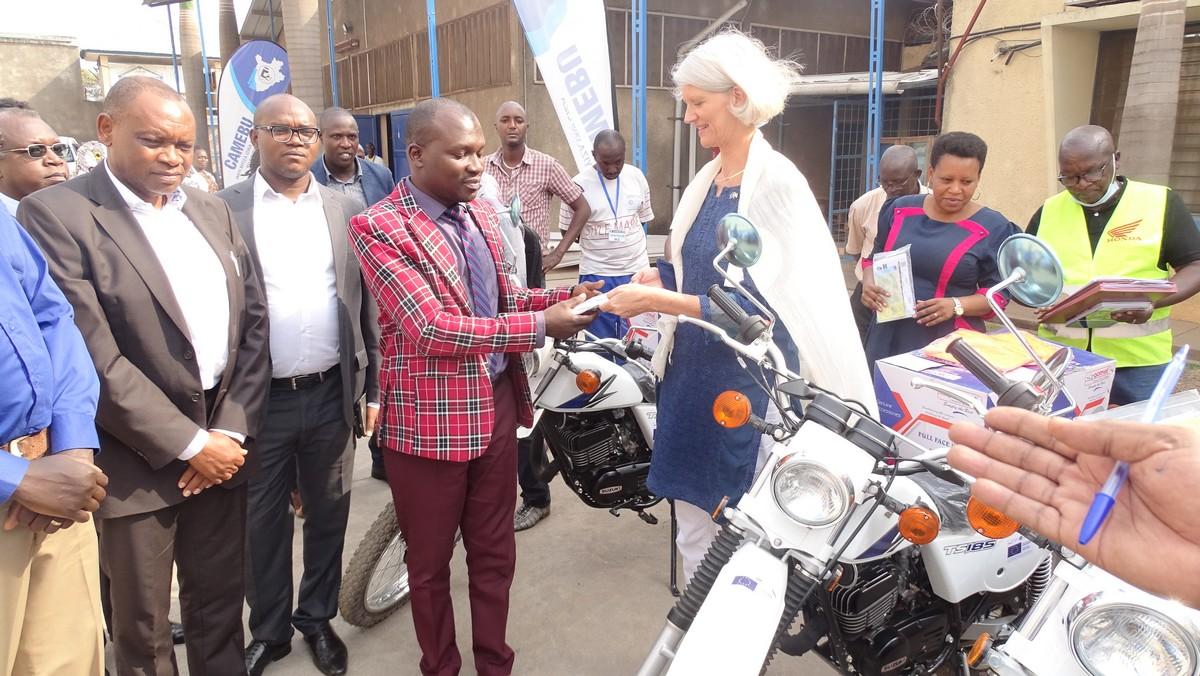
Remise des motos et matériels au MSPLS dans le Cadre du Programme Twiteho Amagara
Jean BIRONKWA | 28/07/2021
Dans le cadre du programme TWITEHO AMAGARA financé par l’Union Européenne, la délégation de l’Union Européenne a remis 10 motos aux Bureaux Provinciaux de la santé des provinces de Bubanza, Karuzi et Muyinga ainsi qu’à leurs 7 districts sanitaires. A côté de ces moyens de déplacement, des équipements destinés aux centres de santé « amis des jeunes » ont également été distribués dans le cadre de ce partenariat.Sept centres de santé appuyés par le consortium dont Enabel est leader et 14 autres centres de santé dont Memisa est leader seront ainsi équipés en équipements bio médicaux et matériel ludique. Il s’agit d'équipements de petite chirurgie, de balances mécaniques, de tables techniques, d'équipements de jeux, d'appareils téléviseurs, d'ordinateurs et autres accessoires. Pour contribuer à accroître l'accès universel à des services de santé de qualité (en particulier paquet minimum et paquet complémentaire), - compris la santé sexuelle et reproductive - et répondre aux besoins spécifiques en matière de santé des populations en situation de crise, Enabel, à travers le consortium Mémisa financé par l’Union Européenne, exécute le programme d’appui à la santé des populations dans le cadre du programme National TWITEHO AMAGARA. Lors de la cérémonie de remise des équipements, Madame Anne Kofoed, chargée d’affaires et représentante de la délégation de l’Union Européenne, a indiqué que la remise de ces équipements était destinés à renforcer l’accès aux soins de la population en général, et plus particulièrement des jeunes, des adolescents et des femmes. Le but ultime étant d’augmenter la capacité du système de santé à fournir une réponse de qualité aux situations humanitaires qui concernent la santé publique et les urgences sanitaires. La cérémonie était présidée par l’Assistant du Ministre de la Santé Publique et de la lutte contre le Sida (MSPLS), le Docteur Onesphore Nzigirabarya, qui a remercié tous les partenaires qui appuient les efforts du gouvernement pour garantir le droit à la santé pour tout burundais : « Je voulais prendre ce moment au nom du MSPLS pour remercier l’Union Européenne de cet appui multiforme. Cet appui contribue énormément à l’amélioration de la qualité des soins de la population burundaise. Je remercie également les consortia Enabel et Memisa pour leur appui technique dans la mise en œuvre des activités prévues dans le cadre de ce programme. Nous sommes très reconnaissants du don de motos qui va faciliter le travail de la supervision dans les bureaux provinciaux et districts de la santé ». Au nom du Représentant Résident d’Enabel au Burundi, le Docteur Etienne MUGISHO Soron’gane, Coordinateur du Portefeuille Santé d'Enabel, a rappelé d’une part que les motos seront principalement utilisées pour aider à asseoir les activités de lutte contre les Violences Basées sur le Genre (VBG) en tant que cause de maladie mentale chez la femme. Il a souligné la complémentarité des consortia Memisa et Enabel dans la mise en œuvre du Programme TWITEHO AMAGARA : « Enabel et Memisa ont décidé de s’appuyer mutuellement dans les deux thématiques, la santé de la reproduction et la santé mentale selon l’expertise de chacun. » Il a rappelé qu’Enabel a une très grande expérience dans la santé mentale et travaille à mettre cette expertise à la disposition du système de santé burundais afin que la lutte contre les VBG puisse faire partie intégrante du système de santé au Burundi.« Quand une femme est perturbée car elle a été violentée par son mari et qu’elle se présente à un centre de santé, il ne faut plus que les centres de santé ou hôpitaux se demandent ce qu’ils doivent faire ; ces structures doivent être outillées pour répondre et prendre en charge les violences comme un problème de santé publique. Les centres de santé et hôpitaux burundais doivent savoir que la question des violences basées sur le genre est un problème important de santé publique. Nous n’y sommes pas encore mais nous nous y acheminons progressivement. Les motos pour superviser les activités relatives sont un pas important dans cette direction. » Dans le cadre de son consortium, Enabel met en œuvre des activités d'intégration de la prise en charge en santé mentale dans le système de santé. Ainsi, des activités comme le plaidoyer, l’élaboration du cadre de référence, la supervision, le renforcement des capacités en santé mentale des prestataires des services de santé, des campagnes de communication sur la VBG, les droits de la femme, le renforcement des FOSA en matériel et équipements sont proposées.
-
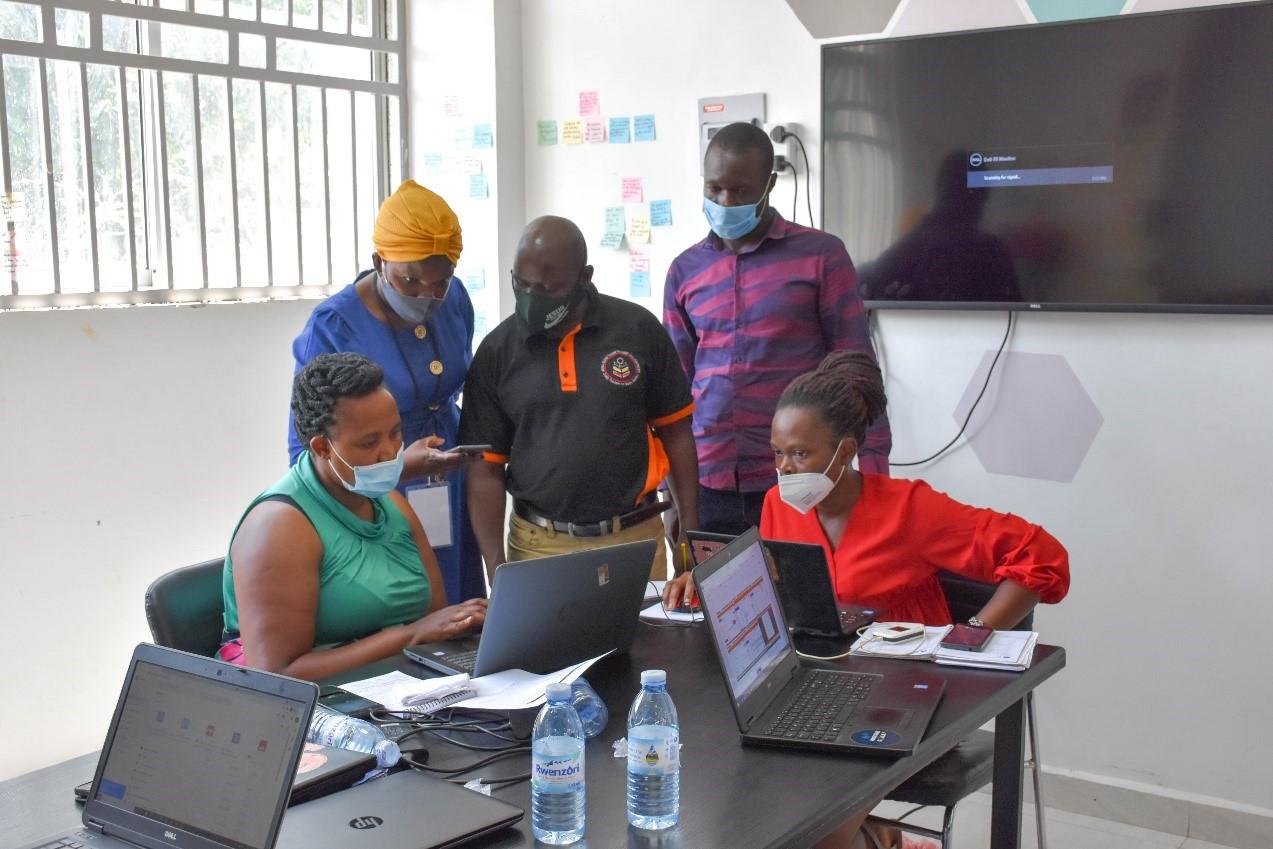
Hacking Our Way to Hybrid Education in the NTCs - Uganda
Peace NERIMA | 27/07/2021
Motivating, co-creative and educational are some of the words participants used to describe the 2nd EduHack that the TTE project launched in May and June 2021 to consolidate and strengthen practices of academic management by Teacher trainers in the 5 National Teacher’s Colleges (NTCs). The series which is an initiative supported by Enabel and the Ministry of Education and Sports in Uganda implemented through the Teacher Training Education (TTE) Project, aimed at bringing NTC lectures in contact with digital and innovative solutions and approaches to promote the sustainability of hybrid education. Following the tremendous setback on the education sector worldwide because of the COVID-19 pandemic and closure of schools in Uganda, there was a need for an adjustment in the teaching and learning experience to suit the new circumstances. The Teacher Training and Education project (TTE) seized this opportunity and introduced ICT in teaching and learning in the 5 National Teachers’ Colleges (NTCs) for the continuity of studies during and after the lockdown and to address pedagogical challenges in our education sector. The 1st EduHack conducted in May was centered on collaborative and interactive workshops in which teacher trainers were tasked with identifying an appropriate Learning Management System (LMS). This exercise was geared towards equipping NTC college lecturers with the skills to manage their students digitally and conduct online trainings through user-friendly and manageable platforms. Through a user-centered approach, the teacher trainers were commissioned to assess the selected Learning Management Systems in order to gain in-depth experience to effortlessly use it to manage their students remotely.The 2nd EduHack gave an opportunity to 65 Lectures to participate in a co-creation workshop to create an online course on Technology Enhanced Learning (TEL). Here, teacher trainers worked on the design of active e-learning content which was aimed at facilitating creative and innovative ICT tools in study sessions. Modules developed using the Sandbox strategy were turned into e-learning material as a way of equipping NTC staff and later NTC students and partner secondary schools with digital skills for ICT in Teaching and Learning. As a result of the 5-day undertaking, all participating teacher trainers were awarded for their submissions of e-learning content to the TEL. Some of the active e-learning activities that were designed and ready to be piloted in the 5 NTCs included 10 podcasts and 10 screencasts.The hands-on workshops were not only filled with capacity building but also peer support and knowledge sharing which encouraged the NTC ICT champions to learn and incorporate this new knowledge into practice. Martin from NTC Kaliro, who managed to hack 3 digital tools including Anchor said that the EduHack series empowered him with scripting, voicing, editing and coordinating skills. Suzan from Kaliro NTC hacked the podcasting tool from which she learnt about timing, voice projection and structuring of content. She said, “I intend to use these skills to create podcasts that educate, motivate and inspire others.” The TTE project will run the 3rd EduHack on Instructional Design in August to provide skills to Teacher Trainers on creating and conducting online lessons for students. This is part of Enabel’s efforts to support the continuity of learning during the closure of schools and support the adoption of hybrid education post-COVID-19 pandemic. Click for more on the EduHack: Podcast on the EduHack series: https://anchor.fm/dorothy-kyamazima/episodes/EduHack-e13pigqDigital Heroes testimonies from the EduHack: https://padlet.com/telsubmissions/Bookmarks
-
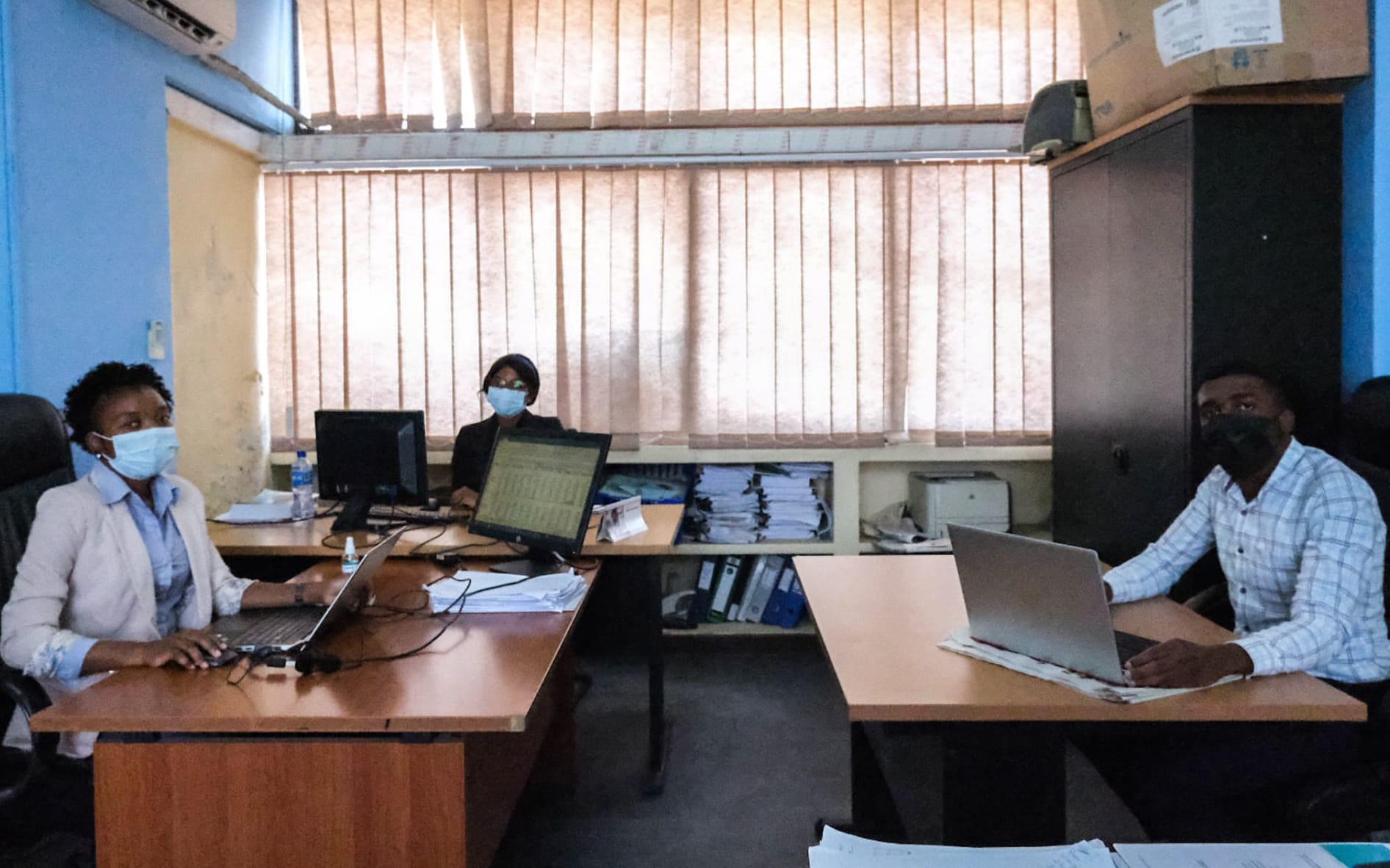
Towards National Junior Experts for the collection and analysis of data on the energy sector in Mozambique?
Akila MUNIR | 22/07/2021
The bilateral collaboration project between the Belgian and Mozambican government “Development of Capacity within the Ministry of Mineral Resources and Energy (MIREME) and the new regulator ARENE”, faces a persistent lack of qualified human resources in MIREME for energy data collection and analysis.It is in this context that in early 2020, five young national university graduates were recruited through Enabel as temporary ‘Energy Data Management Assistants’ to be based in and supervised by MIREME. They were to support MIREME’s planning staff in areas such as surveys, energy balances, demand projections, and energy supply and trade scenarios.So far, these assistants have visited state-related institutions, developed and presented a proposal for the National Energy Balance, supported MIREME’s Statistics Department, and collected long-outstanding energy data. The publication of the last official energy data dates a decade back, and the assistants provide key support towards collecting and publishing the information for the period 2010-2020, together with the National Institute for Statistics (INE).Problems and proposed solutionsAfter the resignation of two of the five assistants, Enabel sought external advice through an interim evaluation of the additional human support programme from Prof.B.Cuamba, an energy expert of the University Eduardo Mondlane in Maputo. The main findings are that although the assistants have contributed to improve the data collection and analysis potential within MIREME, they do not operate under clear enough professional guidance. Prof.B.Cuamba formulates therefore the following recommendations: Provide a clear role and task description, incentives in terms of title and remuneration, and identify future opportunities within MIREME to give a long-term perspective to the assistants;Provide the assistants with further training on the energy sector. This should include certain conditions, such as staying within MIREME for the next 2 years;Establish regular meetings (e.g. weekly) between the assistants and relevant MIREME staff, in which the assistants share their continuously evolving knowledge on energy data with the staff and assist them where needed (using pedagogical tools learned during training);Assign a mentor/ supervisor for each assistant, who can follow-up on their work and make sure they are going into the right direction. This can also be used as an opportunity for the assistant to share doubts, insecurities, etc. A National Junior Expert approach?These recommendations fit remarkably well what we know as the “Junior Expert-approach” of Enabel. This approach gives the opportunity to young graduates to provide specific quality services, and grow professionally with their counterparts, while still learning themselves. Enabel has been using the Junior Expert-approach for years. Junior Experts are assigned to a specific project and have a clear professional framework, with a detailed job description and supervision. This transparency avoids misunderstandings regarding the expectations of both parties and allows a fruitful collaboration. The philosophy behind this approach is to give the opportunity to young graduates to acquire new knowledge and skills on a particular topic, while putting it in practice in their working environment. This creates a double value for both the junior and the partner organization as they both enter a beneficial learning process: The partner organization receives a continuous support, contributing directly to its outputs and development;The Junior Expert has the opportunity to develop personally and grow professionally.Applying a similar approach to the energy data management assistants of MIREME, will, according to the consultant, enable the assistants to grow professionally in a well-framed environment, while contributing to the updating and elaboration of MIREME’s energy data and statistics. Conclusion:Applying the philosophy of the Enabel Junior Expert Programme to the present unclear working conditions of temporary junior staff and assistants within MIREME, may not only give them the opportunity to put in practice acquired knowledge and skills, while MIREME can benefit in the short run from an updated and improved data base on the energy sector, validated by the INE.It also hints at the potential of developing a larger programme of so-called “National Junior Experts” to provide a readily available intervention modality for donors to support capacity strengthening in the public sector and inclusion of the national youth. Public sector human resource constraints may thus be turned into programmes of dedicated technical support, local expertise development, exchange, and even buddying with International Junior Experts. Like International Junior Experts, these national young graduates can then after a limited period of deployment, eventually seek out their own professional trajectories within the public or private energy sector.Unfortunately, as of now, such a programme requires a lot more preparation and mobilization of human resources for coaching and follow-up than MIREME or ARENE can presently offer. But the fact that some of these ‘Energy Data Management Assistants’ are writing up articles at their own initiative on their present work and ideas for the development of the energy sector through biomass resources, for example, points out that young university graduates are eager to get a chance to get involved in the development of their country.By: Esra Nurja and Evert Waeterloos
-

Au Bénin, Enabel participe à l’actualisation de la Stratégie Nationale de Protection, de Sécurité et de Sûreté Maritime
Reece-hermine ADANWENON | 19/07/2021
Elaborée en 2012 et validée en 2013, la Stratégie Nationale de Protection, de Sécurité et de Sûreté Maritime fait peau neuve. Actualisée, la nouvelle stratégie permettra de répondre efficacement aux nouvelles facettes de la criminalité maritime et de prendre en compte les enjeux liés à l’économie bleue qui fait de chaque produit de la mer, une ressource à haute portée économique.Un atelier de lancement du chantier d’actualisation de la stratégie et d’information sur le concept de l’économie bleue s’est tenu à Cotonou au chant d'oiseau, le 16 juillet 2021. Cet atelier était organisé par l’Agence Nationale Chargée de l’Action de l’Etat en Mer (ANCAEM), responsable sous l’autorité du préfet maritime du suivi de la mise en œuvre de cette stratégie, avec l’appui d’Enabel à travers son projet d’appui au développement du secteur portuaire (PASPort). Il a réuni le Cabinet du Ministère des Finances, l’Etat-major général des armées, plusieurs ministères et agences publiques concernées, les autorités traditionnelles, les ONG actives dans cet univers et les structures en charge de la recherche en milieu marin. Dans son mot de bienvenue, le Préfet maritime, capitaine de vaisseau Maxime Ahoyo, a laissé entendre que les travaux d’évaluation et d’actualisation du document de la SNPSSM permettront d’avoir un nouveau document de stratégie pour une transition vers une économie bleue. Ce concept est révélateur de la prise de conscience du rapport de l’homme avec le milieu marin ; le modèle économique actuel produit beaucoup de déchets très peu recyclés. L’actualisation de cette stratégie fait partie, comme l’a rappelé le représentant résident Mr Jean François Michel, d’un ensemble d’actions initiées à la demande du partenaire béninois dans le cadre de l’appui à la révision et l’actualisation du cadre stratégique et institutionnel du secteur portuaire et notamment celui qui a trait à la sûreté maritime, fondamentale pour le transport maritime. Il est prévu un processus participatif qui doit permettre successivement :1) d’identifier les évolutions du contexte national, régional, et international dans le domaine concerné qui doivent être prises en compte, 2) d’évaluer la mise en œuvre de la stratégie depuis la création de l’ANCAEM fin 2014, 3) d’identifier les nouveaux axes de la stratégie,4) de proposer un mécanisme de suivi évaluation de la stratégie ainsi qu’un mécanisme de financement. Ce processus sera conduit par l’ANCAEM avec l’appui d’une équipe de 3 consultants, dont un chef de mission consultant international, et deux consultants nationaux dont un juriste et un environnementaliste, qui ont eu l’occasion de développer brièvement devant les participants les concepts et les problématiques qui devront être abordés.Mr. Orou Herman Takou, Directeur de Cabinet du Ministère de l’Economie et des Finances a rappelé à l’ouverture des travaux « qu’ un nombre grandissant de problèmes sécuritaires persistent dans les zones maritimes tels que le trafic de drogues, la piraterie, la pêche illégale, les vols à main armée. Des acteurs illégaux exploitent librement l’espace maritime africain en raison de son immensité et du manque de dispositifs efficaces de surveillance ». Des mesures efficaces doivent être prises pour endiguer la criminalité maritime. Tout en remerciant Enabel, le directeur de cabinet du Ministère des Finances et de l’Economie, M. Orou Hermann Takou, a procédé à l'ouverture des travaux, en faisant remarquer la présence des chefs religieux qui, selon lui, aideront grâce aux religions endogènes à préserver l'écologie grâce entre autres à la sacralisation de certaines ressources naturelles telles que les forêts, la mer...Pour lui, le défi consiste également à mettre à disposition de la marine nationale les moyens de ses ambitions, à renforcer les capacités opérationnelles des autres acteurs en mer, à opérer des mutations ou des impulsions pour des secteurs historiques ou émergents, et, enfin à démontrer sa compétence en matière de gestion d'espaces naturels marins protégés. Une séance de questions réponses a permis aux participants présents au cours de ce premier atelier de faire des suggestions et de clarifier certains points. Le processus d’actualisation devrait s’étaler sur plusieurs semaines, et un comité de pilotage est en cours de constitution pour valider les divers livrables prévus. Plusieurs ateliers seront organisés au cours de ce processus.
-
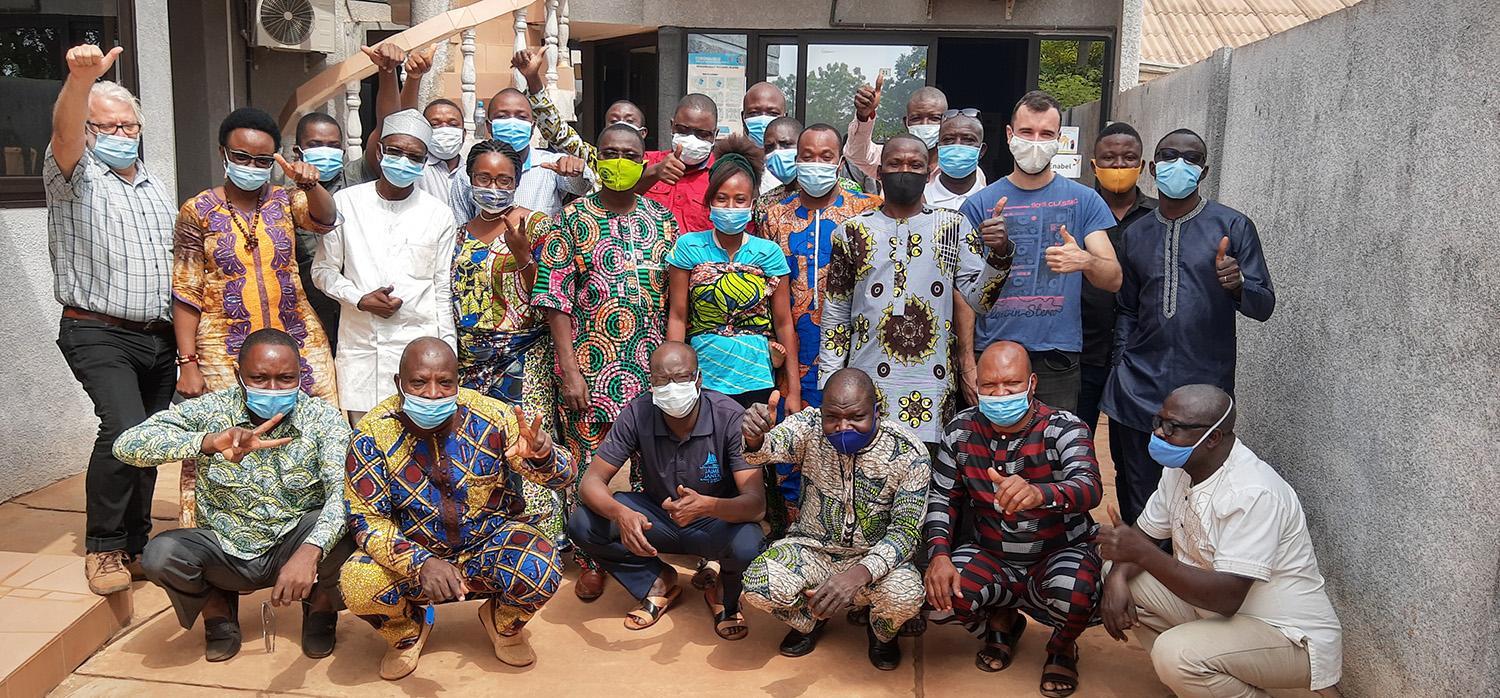
Projet ARISA-B : l’évaluation à mi-parcours constate une bonne appropriation progressive de la réforme
Reece-hermine ADANWENON | 16/07/2021
La mission d’évaluation à mi-parcours du Projet ARISA-B apporte un regard extérieur sur la performance de l’intervention. Conduite par une expertise mixte (internationale et nationale), elle est intervenue du 25 mai au 07 juin 2021 et a couvert l’ensemble du territoire national en se concentrant sur l’appropriation de la réforme et les espaces de coordination et de concertation. L’évaluation a constaté des avancées notables dans l’appropriation des réformes par les acteurs territoriaux pour un meilleur service aux privés. Afin d’avoir les données nécessaires à l’analyse du niveau d’avancement du projet, l’équipe d’évaluateurs a consulté 173 personnes représentant tous les acteurs au niveau des territoires et au niveau central. La mission a présenté son rapport provisoire en se basant sur les critères CAD (Comité d’Aide au Développement de l’OCDE) au terme de l’évaluation. Pour la pertinence, la mission a considéré le projet comme « excellent » sur tous les aspects essentiels, ceci au regard de la stratégie entièrement alignée sur la politique nationale du secteur agricole (PAG, PSDSA, PNIASAN) et couvrant tous les aspects stratégiques au niveau des territoires. En ce qui concerne l’opérationnalisation de la réforme du secteur agricole au niveau des acteurs territoriaux, et malgré la complexité de l’intervention, la combinaison d’une méthodologie adéquate assortie de ressources humaines de qualité et d’un engagement constant des acteurs à tous les niveaux, ont permis de fournir une série de produits de bonne qualité, appréciés par les acteurs, et de limiter les retards causés par les circonstances liées à la pandémie. Elle a également noté une « bonne cohérence » du projet avec les autres interventions d’appui au secteur agricole au Bénin même si des opportunités de synergie restent à exploiter dans la phase de consolidation des actions de renforcement de capacités. Les acteurs rencontrés ont témoigné de la qualité des services du projet, de son organisation opérationnelle et de sa gestion des ressources, avec l’assistance technique thématique travaillant en étroite complémentarité avec les facilitateur(trice)s au niveau des pôles. Aussi, l’efficience de mise en œuvre du projet a été jugée « très bonne ». En matière d’efficacité, les mécanismes d’ajustement et de contrôle de qualité introduits dans la démarche « Parcours d’Acquisition de Compétences (PAC) », avec un prestataire spécifique sur l’ingénierie de formation, ont permis d’ajuster rapidement les problèmes de qualité aux besoins. A cet effet, l’évaluation a noté que « le projet a réussi à délivrer des produits de haute qualité unanimement appréciés par les acteurs ». Enfin, la durabilité reste un défi car, selon la mission, les avancées en matière de renforcement des structures « ne peuvent pas encore être considérées comme acquises ». Elles nécessiteront une focalisation afin d’assurer la continuité des processus initiés, des connaissances et des pratiques diffusées et leur mise à l’échelle. L’évaluation n’a pas occulté les thématiques transversales. A cet effet, elle a noté la prise en compte systématique du genre dans le contenu des parcours d’acquisition de compétences. Les aspects pertinents relatifs à l’environnement et au changement climatique sont principalement liés au contenu technique du conseil agricole et du processus de priorisation des investissements structurants (IAS). Les outils de digitalisation sont également au cœur des modules d’apprentissage consacrés à l’efficience des processus de gestion et de concertation. Sur la base des différents niveaux d’évaluation, la mission a recommandé, entre autres, de mettre l’accent sur la phase d’accompagnement et de coaching des acteurs (bénéficiaires des formations) dans la pratique de leur métier et de veiller à mener une réflexion avec le MAEP sur les conditions nécessaires pour une participation et une implication encore plus forte des Organisations Professionnelles Agricoles (OPA) et l’Organisation Inter Professionnelle des producteurs (OIP), aux différents espaces de dialogue et cadres de concertation promus dans le cadre de la réforme. ARISA-B est la composante territoriale du Programme d’Appui au Développement Durable du Secteur Agricole (PADDSA) financé par l’Union Européenne et mise en œuvre par Enabel.
-
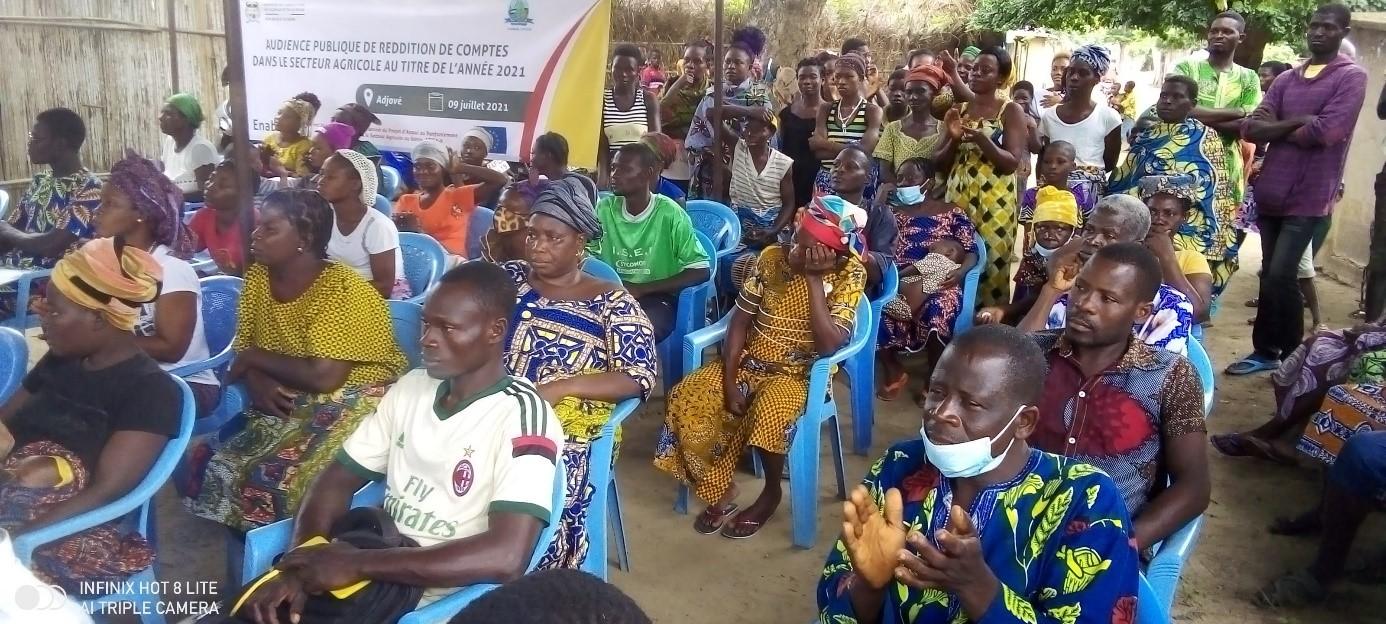
Bonne gouvernance du secteur agricole au Bénin : ARISA-B a accompagné la Mairie d’Athiémé pour la reddition de comptes dans le secteur agricole
Reece-hermine ADANWENON | 16/07/2021
Le vendredi 9 juillet 2021, la Mairie d’Athiémé a organisé, dans le village d’Adjové, l’audience publique de reddition de comptes de l’année 2021 sur le secteur agricole. Cette session, axée sur le développement et la promotion des filières porteuses dans la commune, était l’occasion pour le maire et le Conseil communal de sacrifier à une obligation légale et d’aller au contact des difficultés des populations dans un contexte de promotion des filières.Le Groupement Intercommunal du Mono (GI-Mono) et le projet ARISA-B ont apporté leurs appuis technique et logistique à la réalisation de cette audience publique de reddition de comptes sacrifiant ainsi aux dispositions de l’article 2 de la loi 97-029 du 15 janvier 1999 portant organisation des Communes en République du Bénin et de l’article 40 de la charte nationale sur la gouvernance locale. Présidée par le maire de la commune, Monsieur Kocou Saturnin DANSOU, la session a vu la participation des organisations professionnelles agricoles, des conseillers communaux, des acteurs de la société civile, des élus locaux et surtout des producteurs à la base. Les services déconcentrés de l’Etat dont la DDAEP et l’ATDA 4 (C/CeC) ont également pris part à la session. L’occasion pour le maire de rappeler les réalisations en matière agricole de sa commune au cours de la période de 2019 – 2020 et de recueillir les préoccupations des producteurs pour améliorer la productivité dans différentes filières et les revenus des producteurs agricoles. En termes de réalisations, le maire, en langue locale et en français, a énuméré, entre autres : - les appuis apportés aux producteurs de la filière maraichère en renforçant leur résilience contre les effets du changement climatique ; - les aménagements de sites de production maraîchère et rizicole ; - la mise à disposition des producteurs de kits de semence pour contribuer à la réduction des effets du COVID-19, - les sessions de formations organisées à l’endroit des producteurs sur diverses thématiques ; - la mise en place d’intrants agricoles, matériels et équipements au profit des producteurs ; - les ouvertures de pistes donnant accès aux sites aménagés ; - l’organisation des sessions du conseil communal d’orientation et de suivi du secteur agricole (CCoS) L’autorité communale n’a pas manqué de rappeler les difficultés auxquelles est confrontée sa commune, dont l’insuffisance de ressources propres pour le financement de certaines actions agricoles prioritaires. Elle en a profité pour lancer un appel aux producteurs afin qu’ils contribuent à l’amélioration des recettes communales à travers le paiement de diverses contributions dont la taxes de développement local à travers la commercialisation de la production agricole. Enfin, l’exécutif communal a exposé les perspectives qui se rapportent, entre autres, à la bonne gestion des dotations FADeC pour lesquelles le montage diligent des dossiers conformément aux dispositions en la matière est une priorité. Il en est de même du suivi des actions mises en œuvre par divers projets et programmes dans la commune et qui nécessitent un suivi rapproché des services communaux en étroite collaboration avec les services déconcentrés du MAEP. Les populations d’Adjové, massivement rassemblées à la place publique, ont salué cet exercice qui est une première dans leur localité. Elles ont souligné la nécessité de rencontrer périodiquement l’autorité communale afin de partager avec elle leurs difficultés. Les participants en ont profité pour adresser leurs doléances au Maire et, à travers lui, au conseil Communal. Ces doléances sont entre autres, liées : - à la nécessité de répéter un tel exercice de reddition de comptes qui permet aux populations de porter leurs difficultés à leurs mandants ; - au dédommagement des propriétaires du site devant abriter le lycée agricole de la localité ; - à la destruction des cultures par les éleveurs transhumants (réalisation des aires de pâturage et délimitation des couloirs de transhumance) ; - aux dispositions prises par le maire pour la promotion du crincrin comme filière prioritaire ; - au processus de création et d’immatriculation des coopératives agricoles afin de bénéficier de financementLa reddition de comptes dans le secteur agricole est l’un des objectifs clés du projet ARISA-B afin de permettre une meilleure implication des élus locaux dans le développement agricole de leurs communes. Ces actions sont portées par cinq Associations de Communes qui bénéficient de l’accompagnement du projet pour renforcer leurs capacités ainsi que celles de leurs membres pour mieux assumer leurs rôles et mandats en matière agricole. La même activité est projetée par des communes des départements de l’Atacora, la Donga, l’Alibori, du Borgou et du Plateau.
-
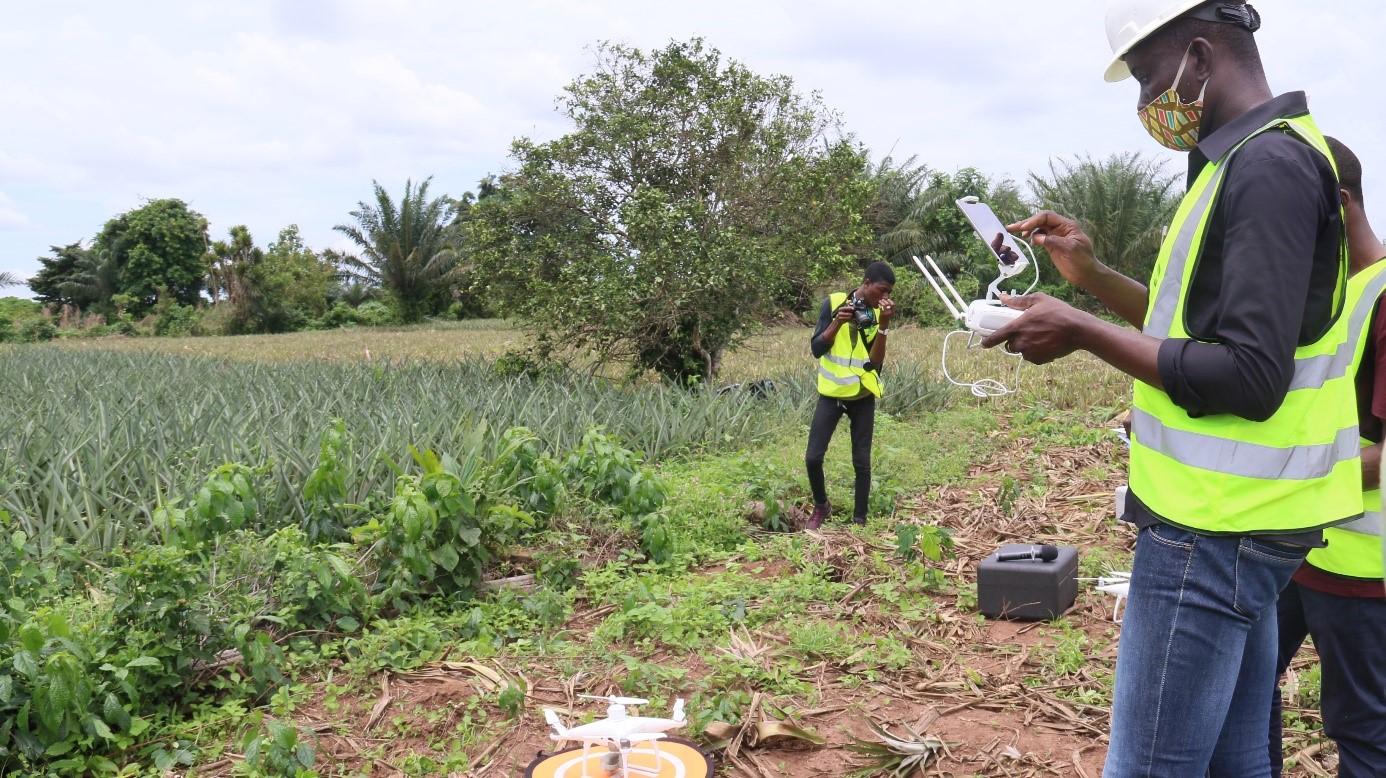
Manipulation des drones et interprétation des données : des agents de conseil agricole et de contrôle outillés
Reece-hermine ADANWENON | 16/07/2021
Démarré en 2019, le programme « Développement de l’Entreprenariat dans la Filière Ananas » (DEFIA) financé et exécuté par Enabel, œuvre pour contribuer à une agriculture intelligente face aux changements climatiques et pour l’amélioration des marges des producteurs. Dans cet optique, DEFIA a entrepris de mettre en place, avec la contribution de l’entreprise Global Partners, spécialisée dans les applications de drones, une solution digitalisée de conseil agricole basée sur l’usage des drones. Elle propose aux producteurs d’ananas du Bénin un dispositif composé de drones et d’algorithmes d’interprétation d’images permettant :de déterminer la superficie des champs, de compter les fleurs et les fruits,et d'identifier les zones et natures des stress (maladies) des cultures.En prélude au déploiement de cette innovation sur le terrain, une formation à l’usage de la solution adressée aux agents de conseil agricole des ATDA 5, 6 et 7, des OPA et des DDAEP intervenant dans la filière ananas a eu lieu du 17 au 28 mai 2021 à Allada. Cette formation permettra aux agents de conseil agricole des ATDA 7,6,5, agents conseillers techniques spécialisés de structures privées en contrat avec DEFIA de disposer des compétences, connaissances en techniques et méthodologiques, attitudes et aptitudes requises à la réalisation des missions de survol de drones et à l’élaboration de diagnostic de l’état phytosanitaire des exploitations d’ananas.
-
L’entrepreneuriat, un des piliers du développement pour les jeunes du secteur de l’enseignement des métiers
Donavine KWIZERA | 16/07/2021
Le 13 juillet 2021, le projet ACFPT en partenariat avec Spark et le Centre de Formation Professionnelle de Rumonge a organisé une journée de sensibilisation sur l’entrepreneuriat. L’entrepreneuriat joue un rôle clé dans la progression de l'économie du Burundi. Il est donc important que les jeunes maîtrisent à la fois l'esprit entrepreneurial et ses compétences. C’est dans ce cadre qu'Enabel a démarré un partenariat avec l’ONG néerlandaise Spark et le Centre de Formation Professionnelle de Rumonge. Avec son programme Akazi Keza, Spark veut créer 6 000 emplois en quatre ans : pour atteindre cet objectif, une formation sera organisée par Spark à l’endroit de 100 lauréats de ce centre, dont 20 seront sélectionnés et accompagnés après un concours de plans d’affaires. Il est envisagé d'étendre cette expérience aux autres centres soutenus par le projet ACFPT. Pour démarrer ce projet pilote à Rumonge, une journée de sensibilisation sur l’entrepreneuriat a été organisée à l’endroit des lauréats et des anciens de ladite école pour les conscientiser sur l’importance de créer leurs propres entreprises. Cette journée de sensibilisation a commencé par la visite de deux savonneries et d’un atelier de menuiserie, trois micro-entreprises accompagnées par Spark qui œuvrent dans le domaine de promotion de l’entrepreneuriat surtout des jeunes. Les activités se sont poursuivies au CFP Rumonge par une visite des Unités d’Appui Pédagogique (UAP) au sein de l’école ; la journée était aussi agrémentée par les témoignages des anciens lauréats et des entrepreneurs accompagnés par Spark. Ainsi, pour UWIMANA Claude de la promotion certifiée en 2019 son métier d’électricité lui a permis d’avoir un revenu stable et de construire sa propre maison. Il a prodigué des conseils aux autres lauréats en mentionnant que l’un des avantages d’un métier est de s’auto-employer, ce qui cadre avec l’entrepreneuriat. Un métier exige une certaine discipline pour gagner la confiance des clients. "Pour aller loin dans la vie en tant qu’entrepreneur, il faut toujours épargner " a poursuivi Claude. Le coordonnateur de Spark à Rumonge, Vincent BIHIMVYUMUDERI, a fait savoir aux lauréats qu’après la formation ceux-ci seront appelés à participer à un concours de plans d’affaires qui permettra de sélectionner les projets les plus prometteurs. Spark accompagnera les projets sélectionnés par le biais de formations continues et de séances de coaching à travers son programme Akazi Keza. Les différents partenaires tels que l’administration, les membres des cellules d’insertion de 14 autres centres appuyés par le projet ACFPT, un représentant de la Direction Générale de l’Enseignement Technique, de la Formation Professionnelle et des Métiers (DGETFPM) ont participé à cette journée ainsi qu’un représentant d’une institution financière qui a exhorté les lauréats à s’intéresser aussi à une éducation financière et à l’épargne. Autour de 300 apprenants et 100 anciens lauréats étaient enthousiastes de participer à cette journée importante qui marque le début de leur voyage entrepreneurial.
-
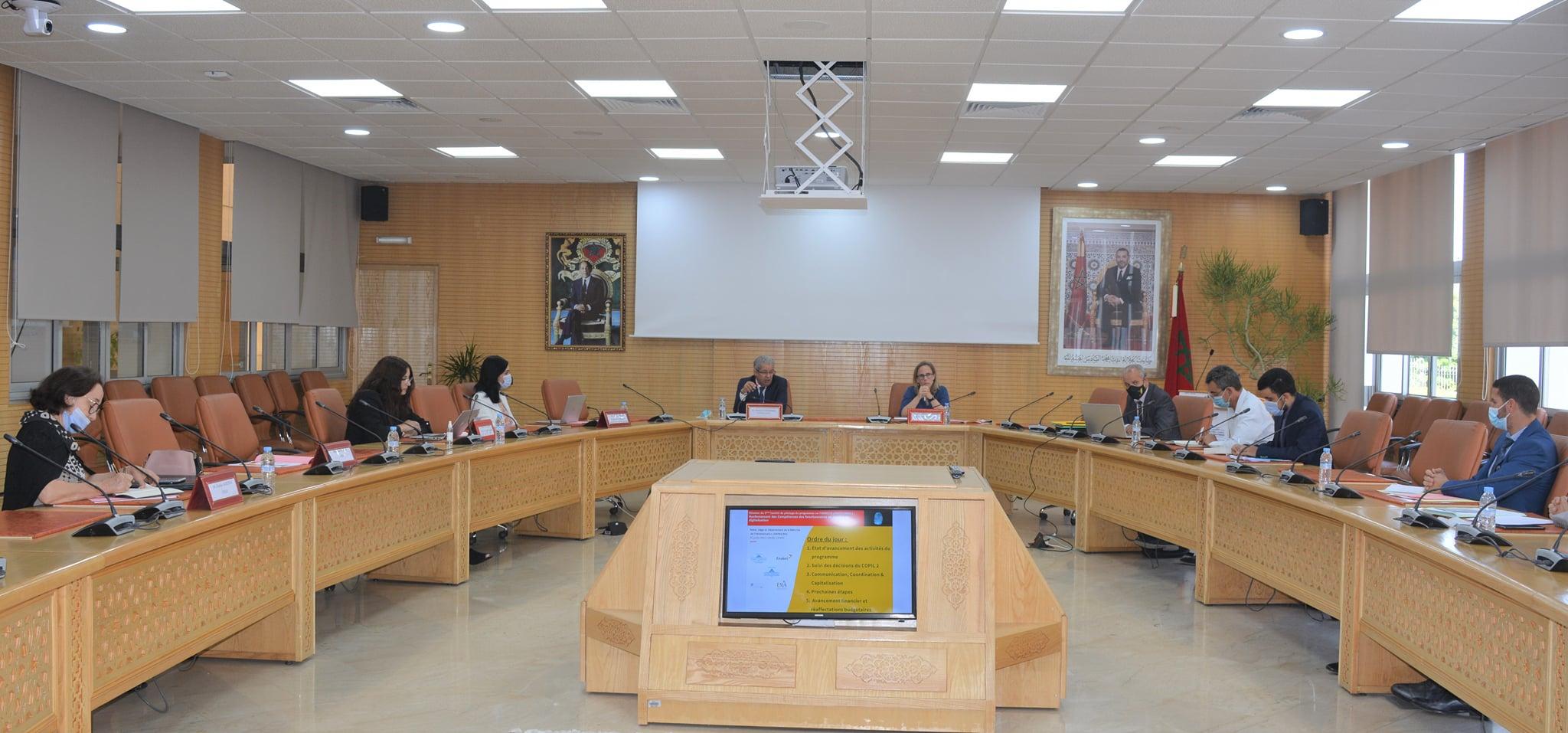
Réunion du 3ème comité de pilotage du programme e-TAMKEEN - Maroc
Bassam ALAOUI MDAGHRI | 15/07/2021
Le 1er Juillet 2021, le programme e-TAMKEEN de renforcement des compétences des fonctionnaires femmes et hommes au niveau central et local en matière de digitalisation, a tenu son troisième Comité de Pilotage au sein du Département de la Réforme de l'Administration.La rencontre a regroupé des représentants d'Enabel, du Département de la Réforme de l'Administration, de l'Agence de développement du Digital (ADD), de l'Ecole Nationale Supérieure de l'Administration (ENSA) et de la Direction du Budget relevant du Ministère de l'Economie, des Finances et de la Réforme de l'Administration (MEFRA).Les discussions étaient centrées principalement sur la présentation de l'état d'avancement du programme et sur la validation des chantiers phares en cours de lancement lors de cette année 2021.
